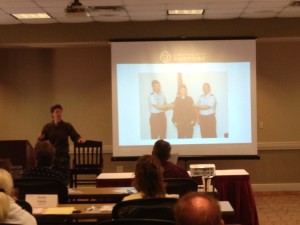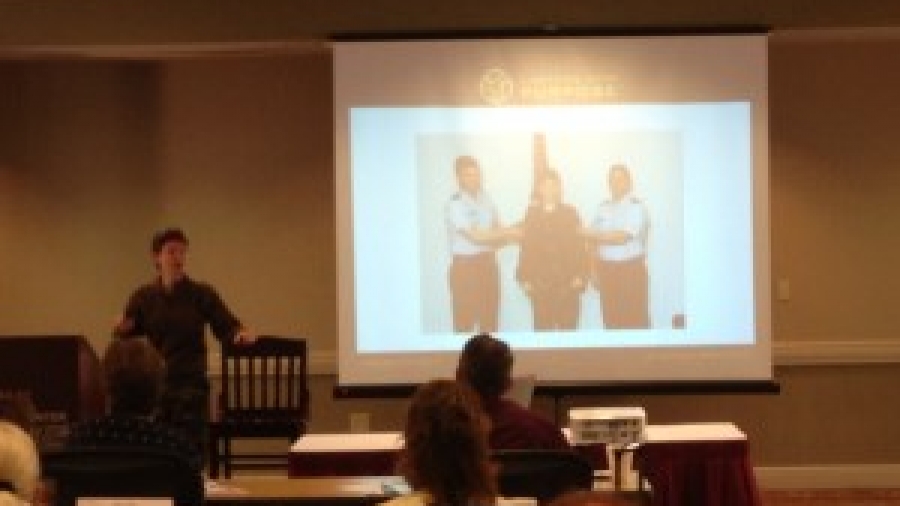 Day Two of LWP's Asset Protection, Medicaid & VA Summit kicks off with Victoria sharing her story getting her first stripes along with her personal experience while serving our country and how it lead to her being a true advocate for our Veterans today.
Day Two of LWP's Asset Protection, Medicaid & VA Summit kicks off with Victoria sharing her story getting her first stripes along with her personal experience while serving our country and how it lead to her being a true advocate for our Veterans today.
We’re Providing 25+ Hours of Education This Week in Atlanta!
 Technology is absolutely fascinating. As I typed this I was on a Delta flight loaded with WIFI and headed to Atlanta for an action filled transformative week in the Estate Planning and Elder Law World. Tuesday and Wednesday our very own National Experts, Dave Zumpano and Victoria Collier will be leading a Two Day Summit on Asset Protection, Medicaid and VA planning (to a SOLD OUT crowd so if you do not have a reserved seat but would like a recorded copy of the event, email motts@lawyerswithpurpose.com ). We are honored to have the opportunity to provide solutions for Asset Protection, Medicaid, and VA Benefits to some of the nation’s top estate planning & elder law attorneys.
Technology is absolutely fascinating. As I typed this I was on a Delta flight loaded with WIFI and headed to Atlanta for an action filled transformative week in the Estate Planning and Elder Law World. Tuesday and Wednesday our very own National Experts, Dave Zumpano and Victoria Collier will be leading a Two Day Summit on Asset Protection, Medicaid and VA planning (to a SOLD OUT crowd so if you do not have a reserved seat but would like a recorded copy of the event, email motts@lawyerswithpurpose.com ). We are honored to have the opportunity to provide solutions for Asset Protection, Medicaid, and VA Benefits to some of the nation’s top estate planning & elder law attorneys.
After over 25+ hours of phenomenal education, software & marketing, we'll be heading on over to the Annual NAELA Conference where Lawyers with Purpose will be one of the Featured Exhibitors of the 2013 Spring Event, celebrating their 25 year Anniversary!
Make certain you stop by The Lawyers with Purpose booth to register to WIN one of two $100 VISA Gift cards. We look forward to seeing many familiar friends and meeting many new as well.
Molly L. Hall, Co-Founder, Lawyers with Purpose, LLC, and author of Don’t Be a Yes Chick: How to Stop Babysitting Your Boss, Transform Your Job and Work with a Dream Team Without Losing Your Sanity or Your Spirit in the Process.
How Does Defeating DOMA Affect Military Personnel and Veterans?
 On Wednesday, March 27, 2013, the Supreme Court of the United States heard over three hours of oral arguments to determine the constitutionality of the Defense of Marriage Act (DOMA), signed into law by President Bill Clinton, enacted on September 21, 1996. DOMA restricts same-sex couples from receiving federal marriage benefits. Moreover, DOMA does not require inter-state recognition of legalized marriages of same-sex couples. Thus, a couple of the same gender who is legally married in Massachusetts would not be recognized as married should they move to a state such as Georgia.
On Wednesday, March 27, 2013, the Supreme Court of the United States heard over three hours of oral arguments to determine the constitutionality of the Defense of Marriage Act (DOMA), signed into law by President Bill Clinton, enacted on September 21, 1996. DOMA restricts same-sex couples from receiving federal marriage benefits. Moreover, DOMA does not require inter-state recognition of legalized marriages of same-sex couples. Thus, a couple of the same gender who is legally married in Massachusetts would not be recognized as married should they move to a state such as Georgia.
Had “Don’t Ask Don’t Tell” not been repealed, this discussion would be moot. But, since homosexuals can now serve in the military openly, the issue of striking down DOMA becomes even more important for both active duty military members as well as veterans.
Many advocate for the unconstitutionality of DOMA due to the discriminatory differences in taxes, employment benefits, wrongful death suits, and approximately 1,100 other federal benefits that are not available to same-sex couples. But for military individuals, the benefits of marriage go well beyond that. For active duty military, when both spouses are in the service, they are assigned to the same military institution. If they have children, then only one spouse is deployed at a time so the children will have one primary parent still at home. The military spouse is paid more when he or she is married. This is just the short list. Veterans who are or could receive service connected disability compensation or wartime pension would also benefit by DOMA being repealed, as would their spouses.
The Supreme Court is expected to have a decision about DOMA in June. Regardless of the outcome, it is noteworthy that the Secretary of Defense has already begun making strides to minimize the discrimination of same sex couples serving in the military. On February 11, 2013, a memorandum extending benefits to same-sex domestic partners of military members was issued in response to the repeal of “Don’t Ask Don’t Tell.” Twenty member-designated benefits and 22 additional benefits for same-sex domestic partners are slated to be in place no later than October 1, 2013. To read the entire memorandum, click here.
The ability for same-sex active duty military, as well as veterans, to be legally recognized as married, will open the door for estate planning opportunities, long-term care opportunities, and asset protection strategies. Becoming aware of and staying abreast of the changes in this area of the law will set your law firm apart from others who are still focusing on the “permanent tax” law.
Victoria L. Collier, Certified Elder Law Attorney, Fellow of the National Academy of Elder Law Attorneys, Co-Founder, Lawyers with Purpose, LLC, and author of 47 Secret Veterans’ Benefits for Seniors…Benefits You Have Earned but Don’t Know About.
As The Horses Marched In Silence
 I went to Washington D.C. last week on vacation in hopes of seeing the cherry blossoms. As luck and a late spring would have it, they were in full bloom. Being a veteran, it was also important to me that I take my children to Arlington National Cemetery to pay our respects and witness the changing of the guard at the Tomb of the Unknown Soldiers.
I went to Washington D.C. last week on vacation in hopes of seeing the cherry blossoms. As luck and a late spring would have it, they were in full bloom. Being a veteran, it was also important to me that I take my children to Arlington National Cemetery to pay our respects and witness the changing of the guard at the Tomb of the Unknown Soldiers.
While walking toward the tomb, I noticed six horses approaching our direction. Since my children are three, they really like horses. As I was getting their attention, the realization hit me that the horses had just performed their duty of delivering the casket of a fallen soldier. Shortly thereafter we heard the 21 gun salute. There are over 27 funeral services per day at Arlington. It was an honor to be able to witness one of them.
Who is permitted to be buried at Arlington? My mother was with me on vacation and she asked me if I was going to be buried there. Unfortunately, for me, the answer is “no” because I don't qualify. To be eligible for burial in the Arlington National Cemetery, the person must have either: died while on active duty; be retired from the Armed Forces; any member of the Armed Forces who was separated prior to October 1, 1949 due to physical disability and who would have been eligible for retirement; any former active duty member of the Armed Forces who received one of the following decorations: Medal of Honor; Distinguished Service Cross (Air Force Cross or Navy Cross); Distinguished Service Medal; Silver Star; Purple Heart; or who was a prisoner of war; or certain qualified family members. For more information about eligibility, visit the Arlington National Cemetery.
While we are all familiar with May 30th being Memorial Day, a day to honor and remember those who served and died for our country and our freedom, it is humbling to be at Arlington any given day when a funeral service is being performed – a daily reminder that service members are dying every day for us.
As an estate planning and elder law attorney, I am privileged to meet so many wartime veterans from WWII, Korea, Vietnam, and now also from the Desert Wars. Each has a unique story. They have protected our country and now want to protect their own families. As attorneys, we have the unique abilities to help them do that through asset protection strategies and estate planning tools. For more information, contact www.LawyersWithPurpose.com.
Victoria L. Collier, Certified Elder Law Attorney, Fellow of the National Academy of Elder Law Attorneys, Co-Founder, Lawyers with Purpose, LLC, and author of 47 Secret Veterans’ Benefits for Seniors…Benefits You Have Earned but Don’t Know About.
VA’s Conduct Regarding Due Process Rights Is Declared Unlawful by Federal Circuit Court
 Veterans must wait an extraordinary amount of time to obtain a decision on an application for disability benefits. Quite often the decision is a denial. The veteran then has the option to appeal the denial to the office of origin, Veterans Affairs Regional Office (VARO), which is exactly where the application was filed and denied. After the VARO confirms its own denial, the veteran may then appeal to the Board of Veterans Appeals (BVA) (also an appellate level within the confines of the VA – administrative law judges who work for and are paid for by the VA).
Veterans must wait an extraordinary amount of time to obtain a decision on an application for disability benefits. Quite often the decision is a denial. The veteran then has the option to appeal the denial to the office of origin, Veterans Affairs Regional Office (VARO), which is exactly where the application was filed and denied. After the VARO confirms its own denial, the veteran may then appeal to the Board of Veterans Appeals (BVA) (also an appellate level within the confines of the VA – administrative law judges who work for and are paid for by the VA).
Veterans are afforded due process rights as part of the application and appeals processes. However, on August 23, 2011, the VA promulgated a new regulation exempting the BVA from certain due process procedures outlined in 38 C.F.R. § 3.103, which govern claimant hearings before the VA. Moreover, the VA dispensed with the legally required formal public comment period, making the new rule effective immediately. The National Organization of Veteran Advocates (NOVA) opposed the VA’s denial of due process rights at BVA hearings and filed a Petition for Review in the Court of Appeals for the Federal Circuit.
On March 21, 2013, the Federal Circuit Court found the VA’s actions unlawful and threatens sanctions as a result of VA’s conduct. The Court is requiring the VA to show cause why sanctions should not be imposed on the responsible officials, recognizing that “sanctions may be needed to motivate VA in the future to treat its commitments and representations to this court and opposing counsel with the seriousness to which they are entitled.”
This decision by the Court is a huge victory for veterans. Lawyers with Purpose, LLP, specifically thanks the advocates of NOVA for their unyielding efforts on behalf of veterans. To read the complete Order of the Court, go to: http://www.cafc.uscourts.gov/images/stories/opinions-orders/11-7191.Order.3-18-2013.1.PDF.
Victoria L. Collier, Certified Elder Law Attorney, Fellow of the National Academy of Elder Law Attorneys, Co-Founder, Lawyers with Purpose, LLC, and author of 47 Secret Veterans’ Benefits for Seniors…Benefits You Have Earned but Don’t Know About.
Official Launch Of Our Automated VA Qualification Worksheet!

Great News! As our members saw from our post on the LWP ListServ, we have officially launched the Automated VA Qualification Worksheet. Victoria Collier is hosting a webinar next Friday, March 15th at 3:00 EST to go through it live with our members.
Some of the newest features on the Automated VA Qualification Worksheet we'll discuss and review are:
– Type of Claimant automation on the income sheet
– Type of Benefit automation on the income sheet.
– Age Analysis automation on the income sheet.
You'll learn how the VA Qualification Worksheet helps with:
– Status of Veteran – Type of Benefit
– Age analysis
– See a Live Case Study
– Bring a Real Client’s Facts and at least one attendee will get to have their numbers plugged in and see immediate results
The VA Qual Worksheet allows you to easily input the financial figures to quickly determine whether the claimant qualifies under the income and asset standard, and if not, how much income or assets the claimant must reduce in order to qualify.
We're so excited about bringing this to our members and for them to start using it today for greater efficiency in their office as well as build confidence with clients! It is also a great training tool for your team.
If your a member and want to register, you can contact Marci Otts at motts@lawyerswithpurpose.com. To learn more about our tools and Lawyers With Purpose membership, please visit www.lawyerswithpurpose.com.
Veteran Pension Benefits Lawyers! Have You Seen What The Federal Trade Commision Is Saying?
 "The Federal Trade Commission warns veterans and their families: Be wary of dishonest advisers offering “free” help with paperwork for pension claims. Unscrupulous lawyers, financial planners and insurance agents advise veterans over 65 to transfer their assets to a trust, or to invest in insurance products, so they can qualify for Aid and Attendance benefits. By following their advice, you could lose your eligibility for Medicaid services and the use of your money for a long time, plus get billed for fees that range from hundreds to thousands of dollars. Whether it’s through an ad or a website, these offers usually involve a free seminar, often at assisted living facilities, senior centers, or other places in your community. They may claim to be veterans themselves, and appeal to your emotions to get you to act. Consider any pressure to act fast as your cue to say no. Your best bet is to take your time, do some research, and consider all your options, including doing nothing."
"The Federal Trade Commission warns veterans and their families: Be wary of dishonest advisers offering “free” help with paperwork for pension claims. Unscrupulous lawyers, financial planners and insurance agents advise veterans over 65 to transfer their assets to a trust, or to invest in insurance products, so they can qualify for Aid and Attendance benefits. By following their advice, you could lose your eligibility for Medicaid services and the use of your money for a long time, plus get billed for fees that range from hundreds to thousands of dollars. Whether it’s through an ad or a website, these offers usually involve a free seminar, often at assisted living facilities, senior centers, or other places in your community. They may claim to be veterans themselves, and appeal to your emotions to get you to act. Consider any pressure to act fast as your cue to say no. Your best bet is to take your time, do some research, and consider all your options, including doing nothing."
http://www.ftc.gov/opa/2013/02/vetspension.shtm
As an elder care attorney, I have been helping middle class, wartime veterans since 2003 obtain VA pension with Aid and Attendance. Since 2005 I have been training lawyers on the eligibility rules and how they, too, could assist wartime veterans and their widows obtain tax free income to help offset the high cost of home health care, assisted living care, and nursing home care. Since 2009, I have personally observed the unscrupulous behaviors of financial advisors, insurance agents, and attorneys who are not accredited by the VA and are only interested in their own short term gain.
In 2012 I co-founded Lawyers With Purpose, LLC, a member organization that is creating a world where people can protect what’s important to them and where client-centered lawyers can be valued for the peace of mind they help provide. The lawyers who are members of Lawyers With Purpose, LLC uphold the highest ethical standards and work within the VA benefits and Medicaid benefits laws to partner with a client in creating a personalized long-term care plan.
My clients tell me that what is important to them is:
(1) living as independently as possible, in their own home when possible;
(2) preserving their quality of life as they age and become disabled; and
(3) protecting their family members who depend on them for support.
This is often accomplished by legally preserving assets and qualifying for assistance from other sources like VA pension with aid and attendance or Medicaid.
As an ethical estate planning and elder care planning attorney, you should not be offended by what the FTC has said, you should make your community aware that these practices are, in fact, happening. You can educate your community on how to protect themselves from the bad actors and distinguish yourself as one of the good guys.
The FTC points out some really good tips for consumers as to how to ensure they are using an advisor who has the client’s best interest in mind, not the advisor’s best interest.
(1) Make sure the advisor is accredited by the Veterans Administration
(2) If you have your own financial advisor but attend a seminar by a different financial advisor or insurance sales person, discuss the information with your personal financial advisor before switching advisors
(3) If you are using a financial advisor to assist with planning, make sure you have an accredited lawyer review the plan (a lawyer that you personally meet with)
(4) Check the state bar for any complaints against the lawyer
(5) Understand that lawyers can charge for creating and implementing an estate plan, to include long-term care planning, but no one can charge to assist you in completing and filing a VA application.
For more tips, go to http://www.consumer.ftc.gov/articles/0349-poaching-veterans-pensions
To learn more about Veteran Benefits and Medicaid Planning register to attend our Lawyers With Purpose program in Atlanta April 30th – May 1st. Click here to register.
Victoria L. Collier, Certified Elder Law Attorney, Fellow of the National Academy of Elder Law Attorneys, Co-Founder, Lawyers with Purpose, LLC, and author of 47 Secret Veterans’ Benefits for Seniors…Benefits You Have Earned but Don’t Know About.
VA Pension With Aid & Attendance, IRAs and SPIAs
 Wartime veterans (or their widows) may receive tax free income to help offset the cost of long term care. The benefit, Improved Pension, commonly referred to as Aid and Attendance, is a means tested benefit wherein the claimant must meet both income and asset limitations.
Wartime veterans (or their widows) may receive tax free income to help offset the cost of long term care. The benefit, Improved Pension, commonly referred to as Aid and Attendance, is a means tested benefit wherein the claimant must meet both income and asset limitations.
The asset limitation is not a bright line figure, however, a standard guide is that if the claimant has more than $80,000 of countable assets (the home, cars, and personal property are exempt), the claim will be denied. Thus, often the veteran will seek counsel from a qualified attorney to assist with asset preservation and qualification for benefits.
A problem with reduction of assets may arise when the veteran has a large retirement account. Unlike other investments or cash account, retirement accounts cannot be liquidated without incurring a sizable income tax consequence.
Can the IRA be converted to a SPIA?
Historically, in this situation, the recommendation was to roll either a portion of or the entire retirement account into a single premium immediate annuity (SPIA). SPIAs create an income stream based on the insured’s life expectancy, thereby eliminating the cash value of the investment. Given there was no cash value, then that automatically reduced the net worth of the claimant, bringing the assets below the permissible limits.
The Veterans Administration has begun denying claims where a SPIA has been used, asserting that the SPIA has not reduced the net worth. Although no laws have changed, the VA has changed its procedure of how it treats annuities when calculating net worth. Until the law does change, my recommendation is that:
(1) if you have pending claims with SPIAs that ultimately become denied, then appeal.
(2) if you have a large retirement account, either
(a) don’t apply for VA benefits, or
(b) use a SPIA but caution your client of the probability of a denial and the likelihood of an appeal.
Victoria L. Collier, Certified Elder Law Attorney, Fellow of the National Academy of Elder Law Attorneys, Co-Founder, Lawyers with Purpose, LLC, and author of 47 Secret Veterans’ Benefits for Seniors…Benefits You Have Earned but Don’t Know About.
The VA Reaches Out To Funeral Directors – Shouldn’t You?
 Would you like to enrich your relationship with funeral directors?
Would you like to enrich your relationship with funeral directors?
As estate planning and elder care attorneys, we are often called upon to provide our clients with guidance around planning for death. Veterans may have more options available to them than non-veterans. In addition to being buried with honors or placed into a national cemetery, there may be monetary benefits available to surviving family members.
The VA recognizes “Veterans and their families need compassion when they approach funeral directors for help.” (quote from Secretary of the VA Eric K. Shinseki). Thus, the VA has developed an entire website providing resources to funeral directors. The site, http://www.cem.va.gov/cem/funeraldirector.asp, can be very useful for the estate planning and elder care attorney as well.
Moreover, many funeral homes and their directors may not be aware of this new site. This is your opportunity to create or further develop your relationship with funeral directors. By bringing this information and the website to their attention, you are providing value to their business. It can also be used as an introduction to you and the services your firm provides.
What would be a simple process to develop this relationship and market to funeral directors?
First, draft a letter of introduction to the funeral director. Attach to your letter a screenshot of the website above. Inform the director that you will be calling in a week or two to schedule a face-to-face meeting to discuss how you may work together to help veterans in need of pre-planning or immediate funeral services.
Then, follow up with the phone call to schedule the appointment. At the end of the appointment, create a relationship action plan – where will you go from here? After thfe appointment, send a handwritten thank you note within three days of the meeting, noting something personal you learned about them. Most importantly, approximately 45-60 days later, review the relationship to determine if it is going anywhere.
Relationship marketing requires continued communication and contact, like any other successful relationship. Lawyers with Purpose has an entire Relationship Marketing System to make this process easy and natural for its members. The Veterans Administration has now provided you with a way to kick start the introduction!
Victoria L. Collier, CELA, Co-Founder Lawyers with Purpose, LLC, Author, 47 Secret Veterans’ Benefits For Seniors.
Three Major Changes in Legal Interpretations You Need to Know
 The VA has been denying Improved Pension with Aid and Attendance claims at record numbers in the past four months. Attorneys and claimants are getting frustrated beyond belief. Are you one of them? Do you know why?
The VA has been denying Improved Pension with Aid and Attendance claims at record numbers in the past four months. Attorneys and claimants are getting frustrated beyond belief. Are you one of them? Do you know why?
At our January program I discussed some of the major changes occurring at the VA today and what we expect to see in the future. It was an eye opener for attendees. All agreed that you cannot and should not practice in the area of VA benefits unless you keep a close tab on the mood and character of the VA and the changes it is making.
Having said all that, the VA laws have not changed. Yet, the VA has changed their “interpretation” of the laws and have made changes to their adjudication practices and procedures in three main areas
(1) how they are treating single premium immediate annuities with regard to countable net worth;
(2) whether or not they will deduct independent living facility and assisted living facility fees as permissible unreimbursed medical expenses (based on stricter medical needs verification); and
(3) eliminating the annual eligibility review process.
Changes to laws and procedure we expect in the future include:
(1) an imposition of a transfer of assets penalty, to include assets transferred to trusts;
(2) assets in certain trusts being treated as part of the net worth calculation to determine eligibility;
(3) longer application and appeals processing times.
Positive changes that have been made, although the results have not yet been proven, is that the VA has added an expedited claims process for widows of veterans (currently the average wait for approval is 12 months). An expedited claims process for veterans already existed.
More, now than ever, it is critical to keep your hand on the pulse of the VA. To do so, we invite you to become a member of Lawyers With Purpose, LLC and keep reading our blogs.
Victoria L. Collier, CELA, Co-Founder Lawyers with Purpose, LLC, Author, 47 Secret Veterans’ Benefits For Seniors.











